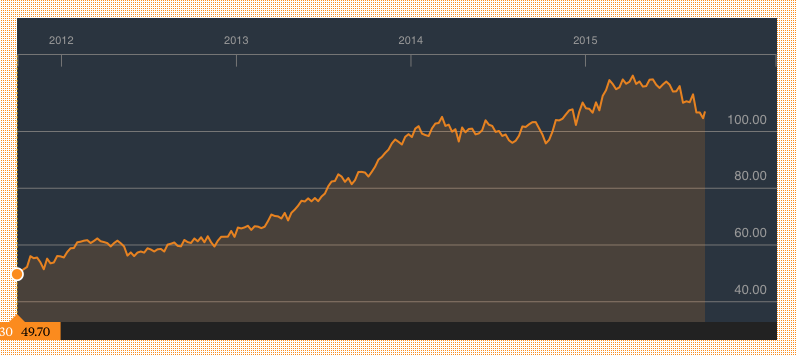Tight budgets and the wind down of US involvement in wars in Iraq and Afghanistan have meant tough times for defense contractors in recent years.
Yet these days defense stocks have been on a roll and attracting investors again for the first time in years.

The SPDR S&P Aerospace & Defense ETF (XAR) is up nearly 6% over the last year through September 9, vs. a 1% decline for the broader S&P 500 Index.

Election Cycles
What do investors see?
First off, defense stocks have a tendency to trend up in the year or so before a US presidential election.
A recent report by Deutsche Bank points out that defense stocks as a group have outpaced the overall market in the year leading up to the election in eight of the last nine races and in every single election since 1984.
Defense Budgets
There’s no political downside to supporting defense spending increases.
After years of tight defense budgets, President Obama’s fiscal 2016 budget proposal, unveiled on Feb 2, 2015, calls for a baseline $534 billion defense budget, plus another $51 billion in so-called “overseas contingency operations” (OCO) funds to fight ISIS and other threats.
The fiscal year 2015 Pentagon budget was all of $496 billion. In other words, the White House is proposing a 7.6% increase in the baseline budget.
The Republican-controlled Senate is suggesting only $523 billion for the basic defense budget, but $90 billion in OCO funds.
Either way, it looks like the Pentagon will have a lot more money to spend over the next year or so.
Iran
Then there’s the controversial, proposed deal with Iran to put its nuclear weapons ambitions on ice.
The US Congress is about to embark on what’s likely to be a very partisan debate on the wisdom of that deal.
However, from a purely economic perspective, the agreement between Iran, the US and other world powers would be wonderful news for US defense contractors.
Defense Contracts
The reason, as Zacks Investment analyst Brian Hamilton points out, is the likely defense sales the US will make to Israel and Gulf Allies to win their support for the nuclear deal.
Recently, Secretary of State John Kerry sent a letter to Congress stating that Israel and America’s Gulf Allies would be “taken care of” in terms of military intelligence and security cooperation.
Hamilton thinks that will translate into sales of next-generation F-35 fighter aircraft and missile defense systems.
Iran Plays
It is not just Israel that will be receiving assistance, the Gulf States, including the United Arab Emirates (UAE), and Saudi Arabia will “receive arms shipments and new security deals.”
The goal of the administration is to improve “ballistic missile capabilities in the region,” according to the letter.
These military and cooperation assistance measures are designed to deter any Iranian “aggression against any GCC member state.”
As a result, Hamilton likes defense stocks such as Lockheed Martin Corp (LMT), General Dynamics (GD), Northrop Grumman (NOC) and Raytheon (RTN)
Takeaway
After a tough stretch, defense stocks are getting a second look from global investors.
Defense contractors are enjoying a nice tailwind from election year politics and more generous defense budgets.
On top of that, the likely nuclear deal with Iran looks like a winner for defense stocks.
In the investing world, defense stocks are ascendant.
Photo Credit: Wilson Hui via Flickr Creative Commons



